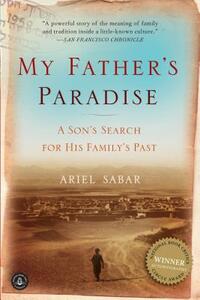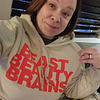Take a photo of a barcode or cover
This is the story of the author's family. Born and raised in the United States, Ariel Sabar sets out to discover his family's past in Kurdistan. For 3000 years, Jews lived in Kurdistan, spoke Aramaic, and lived peacefully among the Christians and Jews who surrounded them. However, in the earlier part of this century, all of that changed and the Jews in Kurdistan fled to Israle where Ariel's father spent a portion of his life. His father finally moved to the United States and became a well known professor in Los Angeles. Ariel never really connected with his father growing up - never understood his old world traditions he held on to. Until Ariel had a child of his own. Ariel journeys with his father to his old village in Kurdistan- Zakho - to discover who his father and family really are.
This is a very good book. It is no doubt that I am a lover of non-fiction, but my favorite is storytelling from usually the author or about a particular person/family. The books for me that should the loudest are the personal stories - not just a straight history. Ariel weaves a story of his father's family and how they lived, their traditions, their flee, and finally the return to visit the land they once called home. You get great insight into the Jewish story in this land. It shouldn't be missed.
This is a very good book. It is no doubt that I am a lover of non-fiction, but my favorite is storytelling from usually the author or about a particular person/family. The books for me that should the loudest are the personal stories - not just a straight history. Ariel weaves a story of his father's family and how they lived, their traditions, their flee, and finally the return to visit the land they once called home. You get great insight into the Jewish story in this land. It shouldn't be missed.
Good story of a son discovering his father's past and childhood. His father carries an inspiring past and his story of growth and overcoming his environment has you cheering him on.
adventurous
emotional
informative
reflective
sad
medium-paced
This book was really informative. I learned a lot about the history of Jewish Kurds in Iraq. Ariel Sabar's writing is emotional and compassionate. He breathes life into the people and the stories. His emotional connection to the stories is obvious, and I think it makes his writing stronger. I also found his discussion of his father's work preserving Neo-Aramaic really interesting.
The latter part of the book describes his turbulent relationship with his father and their trip back to his dad's village. I appreciate his deep vulnerability when talking about his past behavior towards his dad and how he is trying to rebuild a relationship with him. I just didn't find this part of the book quite as interesting.
The latter part of the book describes his turbulent relationship with his father and their trip back to his dad's village. I appreciate his deep vulnerability when talking about his past behavior towards his dad and how he is trying to rebuild a relationship with him. I just didn't find this part of the book quite as interesting.
Graphic: Racism, Xenophobia, Kidnapping, War
I had to read this for a class, and I was surprised by how much I enjoyed it. Just riveting, from beginning to end.
The first third of this book was absolutely fascinating and worth reading the book just to get that. The view of Zakho from the grandmother and child's perspective were really cool. Then they all went to Israel, and the whole book kind of fell apart. I guess because I kind of knew that story, and there wasn't a lot to personalize it really. Anyway, I wasn't really sure what to make of the rest of the story where he moves to Israel and then the US. There was this weird tangent about finding a missing aunt, and that was really strange, and I don't know. I didn't enjoy the last half of this book as much as I did the first half. Which is unfortunate, really, because I really enjoyed the first half.
adventurous
informative
reflective
medium-paced
adventurous
emotional
funny
informative
inspiring
reflective
medium-paced
Sabar writes an eloquent history of his family and of the Kurdish Jews of Zakho, Iraq. Beautifully written, Sabar follows his father's journey from a boyhood in Iraq, to working and attending night high school in Jerusalem and a professorship at UCLA.
I didn’t give enough time to read this before I had to return it but it was well-written and interesting. I went to the end to learn about the missing sister/aunt and how the author’s perspective changed. I also appreciate learning about how diverse the “Middle East” is and while there is bad history there is lots of coexistence and humanity too. The quotes from historical travelogues that dismissed this part of the world are thus appropriately jarring and ridiculous when they are discussed after the human journey the author takes us on.
An excellent read and an exploration of what it means to be Jewish, as well as the value and importance of family, for people born in the modern age.





